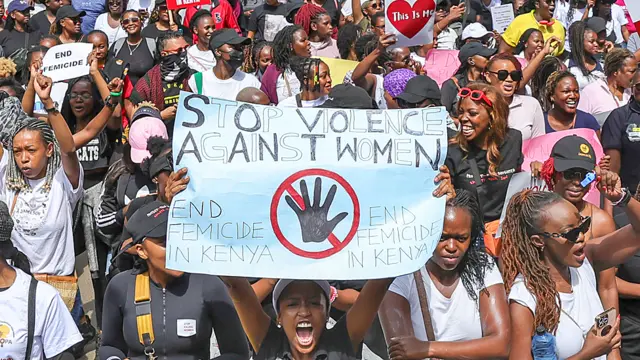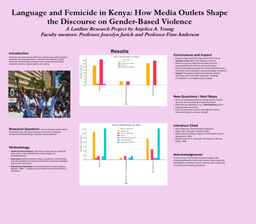Project Outline: Language and Femicide in Kenya: How Media Outlets Shape the Discourse on Gender-Based Violence

Background
Femicide, the gender-based killing of women, is an urgent crisis in Kenya. Since 2016, over 500 women have been murdered, yet national outrage has not translated into significant change. Despite growing public protests, including demonstrations as recent as December 2024, femicide remains normalized in many corners of society. One reason may lie in the power of language. The media does not simply report facts; it frames them, shaping how society interprets violence, responsibility, and justice. Existing feminist research shows that euphemisms, passive constructions, and victim-blaming language can desensitize the public and downplay systemic violence. In Kenya, where newsrooms have wide influence, it is imperative to examine how media language contributes to public understanding (or misunderstanding) of femicide.
Objectives and Research Questions
This project aims to investigate how Kenyan media reports shape public discourse around femicide through linguistic framing. It seeks to understand the editorial decisions behind news coverage and explore how activists are working to reframe narratives. Key questions include:
-
What language patterns (e.g. euphemisms, victim-blaming, or passive constructions) are commonly used in Kenyan news reports on femicide?
-
How do editorial choices influence the public's perception of victims, perpetrators, and systemic causes?
-
What strategies are grassroots activists and media professionals using to counter these narratives?
-
How can journalism more responsibly and effectively report on gender-based violence?
Methodology
This project uses a qualitative, mixed-methods approach:
-
Media Content Analysis: I will analyze news coverage of 100 femicide cases in Kenya since 2016, sourced from outlets such as Citizen TV Kenya, KTN News, NTV Kenya, The Daily Nation, Standard Digital, and Tuko News. The analysis will code for patterns in headline structure, grammatical framing, word choice, and tone to identify whether and how language may trivialize, sensationalize, or obscure the violence.
-
Interviews with Media Professionals and Activists: I will conduct interviews with Kenyan and Columbia-based journalists, editors, and grassroots activists. These include conversations with individuals such as Dean Jelani Cobb of Columbia Journalism School, Larry Madowo (a Columbia Journalism School alumnus and CNN international correspondent), and anti-femicide advocates behind digital platforms like @endfemicideke and @whoisnashii. The goal is to better understand how editorial decisions are made, what constraints journalists face, and how activists are reclaiming narrative power.


Please sign in
If you are a registered user on Laidlaw Scholars Network, please sign in